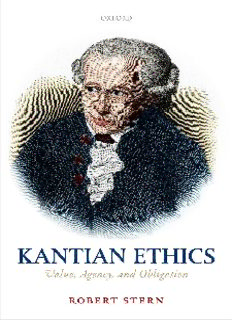Table Of ContentKantian Ethics
Kantian Ethics
Value, Agency, and Obligation
Robert Stern
1
3
GreatClarendonStreet,Oxford,OX26DP,
UnitedKingdom
OxfordUniversityPressisadepartmentoftheUniversityofOxford.
ItfurtherstheUniversity’sobjectiveofexcellenceinresearch,scholarship,
andeducationbypublishingworldwide.Oxfordisaregisteredtrademarkof
OxfordUniversityPressintheUKandincertainothercountries
#inthisvolumeRobertStern2015
Themoralrightsoftheauthorhavebeenasserted
FirstEditionpublishedin2015
Impression:1
Allrightsreserved.Nopartofthispublicationmaybereproduced,storedin
aretrievalsystem,ortransmitted,inanyformorbyanymeans,withoutthe
priorpermissioninwritingofOxfordUniversityPress,orasexpresslypermitted
bylaw,bylicenceorundertermsagreedwiththeappropriatereprographics
rightsorganization.Enquiriesconcerningreproductionoutsidethescopeofthe
aboveshouldbesenttotheRightsDepartment,OxfordUniversityPress,atthe
addressabove
Youmustnotcirculatethisworkinanyotherform
andyoumustimposethissameconditiononanyacquirer
PublishedintheUnitedStatesofAmericabyOxfordUniversityPress
198MadisonAvenue,NewYork,NY10016,UnitedStatesofAmerica
BritishLibraryCataloguinginPublicationData
Dataavailable
LibraryofCongressControlNumber:2015936892
ISBN 978–0–19–872229–8
Printedandboundby
CPIGroup(UK)Ltd,Croydon,CR04YY
LinkstothirdpartywebsitesareprovidedbyOxfordingoodfaithand
forinformationonly.Oxforddisclaimsanyresponsibilityforthematerials
containedinanythirdpartywebsitereferencedinthiswork.
Contents
Acknowledgements vii
ListofAbbreviations ix
Introduction 1
Part I. Themes from Kant’s Ethics
1. Kant,MoralObligation,andtheHolyWill 15
2. ConstructivismandtheArgumentfromAutonomy 40
3. TheValueofHumanity:ReflectionsonKorsgaard’s
TranscendentalArgument 57
4. MoralScepticismandAgency:KantandKorsgaard 74
5. MoralScepticism,Constructivism,andtheValueofHumanity 90
6. Does‘Ought’Imply‘Can’?AndDidKantThinkItDoes? 106
7. WhyDoesOughtImplyCan? 122
Part II. Ethics after Kant
8. OnHegel’sCritiqueofKant’sEthics:Beyondthe‘Empty
Formalism’Objection 139
9. DoesHegelianEthicsRestonaMistake? 157
10. ‘MyStationanditsDuties’:SocialRoleAccountsofObligation
inGreenandBradley 171
11. TheEthicsoftheBritishIdealists:PerfectionismafterKant 190
12. RoundKantorthroughHim?OnJames’sArgumentsforFreedom,
andtheirRelationtoKant’s 202
13. ‘DutyandVirtueAreMoralIntroversions’:OnLøgstrup’sCritique
ofMorality 224
14. DivineCommandsandSecularDemands:OnDarwallonAnscombe
on‘ModernMoralPhilosophy’ 243
Bibliography 265
Index 281
Acknowledgements
Thepapersinthiscollectionalsoappearinthefollowingplaces,andwherenecessary
Iamgratefulforpermissiontoreprinttherelevantmaterial:
Chapter1: ‘Kant, Moral Obligation, and the Holy Will’, in Mark Timmons and
Sorin Baiasu (eds.), Kant on Practical Justification: Interpretative Essays (Oxford:
OxfordUniversityPress,2013),pp.125–52
Chapter2:‘ConstructivismandtheArgumentfromAutonomy’,inJamesLenman
and Yonatan Shemmer (eds.), Constructivism in Practical Philosophy (Oxford:
OxfordUniversityPress,2012),pp.119–37
Chapter3: ‘The Value of Humanity: Reflections on Korsgaard’s Transcendental
Argument’, in Joel Smith and Peter Sullivan (eds.), Transcendental Philosophy and
Naturalism(Oxford:OxfordUniversityPress,2011),pp.74–95
Chapter4:‘MoralScepticismandAgency:KantandKorsgaard’,Ratio,23(2010),
pp.451–74
Chapter5: ‘Moral Scepticism, Constructivism, and the Value of Humanity’, in
Carla Bagnoli (ed.), Constructivism in Ethics (Cambridge: Cambridge University
Press,2013),pp.22–40
Chapter6:‘Does“Ought”Imply“Can”?AndDidKantThinkItDoes?’Utilitas,16
(2004),pp.42–61
Chapter7: ‘Why Does Ought Imply Can?’, in Marcel van Ackeren and Michael
Kühler (eds.), The Limits of Moral Obligation: Moral Demandingness and Ought
ImpliesCan(Abingdon:Routledge,2016),pp.100–15
Chapter8:‘OnHegel’sCritiqueofKant’sEthics:Beyondthe“EmptyFormalism”
Objection’, in Thom Brooks (ed.), Hegel’s Philosophy of Right (Oxford: Wiley-
Blackwell,2012),pp.73–99
Chapter9: ‘Does Hegelian Ethics Rest on a Mistake?’ in Italo Testa and Luigi
Ruggiu (eds.), I That Is We, We That is I: Contemporary Perspectives on Hegel
(Leiden:Brill,2015)
Chapter10: ‘“My Station and its Duties”: Social Role Accounts of Obligation in
Green and Bradley’, in Nicholas Boyle, Liz Disley, and Karl Ameriks (eds.), The
Impact of Idealism: Volume 1 Philosophy and Natural Sciences (Cambridge:
CambridgeUniversityPress,2013),pp.299–322
Chapter11:‘TheEthicsoftheBritishIdealists:PerfectionismafterKant’,inSasha
Golub and Jens Timmermann (ed.), The Cambridge History of Ethics (Cambridge:
CambridgeUniversityPress,2015)
Chapter12:‘RoundKantorThroughHim?OnJames’sArgumentsforFreedom,
andtheirRelationtoKant’s’,inGabrieleGavaandRobertStern(eds.),Pragmatism,
Kant,andTranscendentalPhilosophy(Abingdon:Routledge,2015)
viii ACKNOWLEDGEMENTS
Chapter13:‘“DutyandVirtueAreMoralIntroversions”:OnLøgstrup’sCritique
of Morality’, in Hans Fink and Robert Stern (eds.), What is Ethically Demanded?
Essays on Knud Ejler Løgstrup’s ‘The Ethical Demand’ (Notre Dame: Notre Dame
UniversityPress,2016)
Chapter14:‘DivineCommandsandSecularDemands:OnDarwallonAnscombe
on“ModernMoralPhilosophy”’,Mind123(2014),pp.1095–122
Manypeoplehavehelpedmetoproducetheworkcollectedinthisvolume;some(but
Ifearnotall)arethankedintherelevantpapers.ColleaguesandstudentsatSheffield
have also been particularly supportive, as has my family, for which I am extremely
gratefuloncemore.ThanksalsogotoPeterMomtchiloffofOUPforagainsupport-
ing another collection of my papers, which is a kind of companion volume to my
earlierHegelianMetaphysics(Stern2009).
Iwouldliketodedicatethisvolumetothememoryofmyfather,agoodman.
List of Abbreviations
Ingeneral,Ihaveusedtheauthor/datesystemofreferencing.However,inthecaseof
KantandHegel,Ihaveusedasystemofabbreviations(seebelow),wheredetails of
theworksaregivenintheBibliography.
Works by Kant
References are given to one of the following translations, followed by references to
thevolumeandpagenumberoftheAkademieeditionofKant’sworks(Kant1900–),
except for referencesto CPR,which are given to the pagination of the first (A) and
second(B)editionsinthestandardmanner.
CBHH ConjecturalBeginningofHumanHistory,translatedbyAllenWood,in
Kant2007:160–75
CJ CritiqueofthePowerofJudgment,translatedbyPaulGuyerandEric
Matthews,inKant2000
CPR CritiqueofPureReason,translatedbyPaulGuyerandAllenWood,in
Kant1998
CPrR CritiqueofPracticalReason,translatedbyMaryJ.Gregor,inKant1996a:
133–272
CS ‘OntheCommonSaying:ThatMayBeCorrectinTheory,butItIsofno
UseinPractice’,translatedbyMaryJ.Gregor,inKant1996a:273–310
GMM GroundworkoftheMetaphysicsofMorals,translatedbyMaryJ.Gregor,in
Kant1996a:37–108;andonoccasionrevisedinthelightofKant2011
LE LecturesonEthics,translatedbyPeterHeath,inKant1997
LR LecturesonthePhilosophicalDoctrineofReligion,translatedbyAllen
W.Wood,inKant1996b:335–452
MM TheMetaphysicsofMorals,translatedbyMaryJ.Gregor,inKant1996a:
353–604
OCS OntheCommonSaying:ThatMayBeCorrectinTheory,ButItIsofnoUse
inPractice,translatedbyMaryJ.GregorinKant1996a:287–8
PP TowardPerpetualPeace,inKant1996a:311–52
Relig ReligionwithintheBoundariesofMereReason,translatedbyGeorgedi
Giovanni,inKant1996b:39–216
Description:This volume presents a selection of Robert Stern's work on the theme of Kantian ethics. It begins by focusing on the relation between Kant's account of obligation and his view of autonomy, arguing that this leaves room for Kant to be a realist about value. Stern then considers where this places Kant

